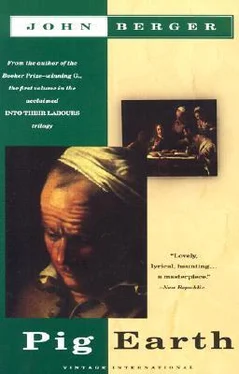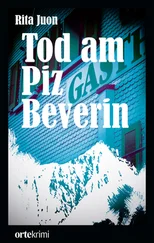No, just sit beside me.
When she sat beside him, he laid his head in her lap and she combed his hair with her fingers.
You have very gentle hands, he said for the second time.
It’s like raking hay, she said laughing.
She broke off the story there. I do not know whether they made love. Perhaps it is only my own memories which make me ask the question. Yet there was something in the way the Cocadrille recounted her meetings with men which always left you speculating.
The two maquisards departed next day. Within forty-eight hours the village heard that a group of maquisards had been surprised in their camp by the Milice, taken prisoner, transported to A … and shot in a field there. There were six in the group and they included the peasant from the Dranse and Saint-Just. It was said that the Milice could never have found the camp, unless they had been tipped off by an informer.
The Cocadrille shrieked when she heard the news. At supper that night she was still crying with bloodshot eyes.
In God’s name stop it, woman! Henri’s wife exclaimed. In any case a woman of your age should be ashamed!
Those who sleep with dogs, wake up with fleas, said Edmond.
That’s good! shouted Henri. That’s good! Those who sleep with dogs, wake up with fleas!
She never forgave the insult. She began, as she had done when she was a child, to disappear. Without telling her brothers, she would be absent for a whole day, sometimes two days and a night. It became impossible to confide any regular job to her. She gradually withdrew her labour, as job after job appeared to her shameful. Not shameful in itself, but shameful for her to perform for two men whom she could not forgive.
Soon she was no longer on speaking terms with anybody in the house. She slept in the stable. She ate by herself. To save the bother of eating more than once a day, she rolled herself cigarettes. Her brothers were in constant dread that deliberately or accidentally she would set fire to the farm. They threatened to beat her if they found her smoking in the stable. In revenge she put an unlit cigarette in her mouth whenever she saw one of them approaching.
It was Henri who first spoke in the village of the Cocadrille’s stealing. She stole, he said, eggs from his wife’s chicken house. Since she doesn’t work, he added, she has no right to them, and she sells them for money.
Some believed him and sympathised; others argued that she was, after all, his sister and he owed her her share of the inheritance. Gradually it became apparent that she was stealing from other gardens. A few lettuces, some plums, a marrow or two. Nobody, except Henri and Edmond, took these small thefts very seriously. They were humiliated by them.
The end came with the fire. The Cabrol grenier burnt down one autumn morning. The two brothers accused the Cocadrille of having deliberately set light to it.
They went to see the Mayor and they told him that they could no longer take responsibility for the actions of their sister, whose unleashed madness was Stealing and Arson. The Mayor was reluctant to refer the matter to any outside authority. It was his wife who thought of the solution which he finally proposed to Henri and Edmond. They accepted it enthusiastically. And with this proposal the first life of the Cocadrille came to an end.
The Second Life of Lucie Cabrol
HOW LONG DISTANCES seem to a peasant may depend on how he cultivates his land. If he grows melons between cherry trees, five hundred metres is a considerable distance. If he grazes cows on a mountain pasture, five kilometres is not far. To the Cocadrille, who could cultivate nothing, because she now had no land, twenty kilometres became a short distance. She walked fast. When she was an old woman, people still commented on how quickly she disappeared. One moment they saw her on a path: the next moment hillside and skyline were empty. She usually carried a sack and, sometimes, tied across her back, a large blue umbrella.
One September morning in 1967 she set out early. The place she was making for was a high forested plateau, about eight kilometres away from where she now lived. When a pine tree falls in that forest, struck by lightning, or its roots are torn out of the earth by a gale, it lies where it fell until its wood turns grey, stifled by snow in winter and burnt by the sun in summer. There are no paths there. You can see on the fallen tree trunks hundreds of systematically dismantled pine-cones, which the squirrels have eaten, undisturbed since the thaw in the spring. Everywhere, climbing over roots and boulders, wild raspberries grow.
The canes were taller than she. As she picked them she crooned. This was to frighten the snakes. With her left hand she bent the canes back so that their under-sides, clustered with fruit, were uppermost: then, between the finger and thumb of her right hand she picked, going from cluster to cluster, until she was so far stretched over the cane that she risked falling forward on to her face. Any fruit that failed to come away easily from their white cores she left. Those she picked she put in the palm of her left hand. The berries were warm and granular like nipples. She held them in her calloused dirt-lined palm without squashing them. When she could hold no more she turned round and emptied the handful into a frail made of thin wood. As she moved forward through the forest, she left behind her thousands of white cores from which she had taken the fruit.
I was watching her. I had climbed up to the forest the same morning to look for bolets which grow along its upper edge, where the pines stop. To my surprise I saw a very small old woman in black among the trees. Since my return I had only heard about the Cocadrille from others.
After I arrived in Buenos Aires I seldom gave her a thought. If she came to mind at all, I congratulated myself on my luck in escaping her guile. I remained convinced that she had tried to trap me into marriage. Fortunately she had failed — probably because she was sterile. Contrary to what one might expect, as time passed, I thought of her more often. I took for granted my luck in not having become entangled with her. And in the hot airless nights of the city, not far from one of the vilest shanty towns, I used to picture to myself an alpine summer. One of the things I recalled was the long grass beneath the stars beside the Cabrol chalet. And then even her plotting seemed to me to belong to a life that was carefree and innocent.
Among the trees in the forest, she straightened her back from time to time and ate some of the fruit. I hid so she would not see me. I wanted to watch her unawares.
After twenty-five years in the Argentine, I went north to Montreal where, for a while, I was rich. I had my own bar there. Sometimes I would tell my story about the goats in the moonlight and the Cocadrille. Once a client asked me: Was this woman a dwarf? And I had to explain. No, she was not a dwarf, she was tiny, she was underdeveloped, she was ignorant, she was like a dwarf, but she wasn’t. If she was physically like a dwarf, the client reasoned, she surely was a dwarf. No, I said.
When I next looked towards the forest, she had disappeared. Not a branch moved. The red cones hung motionless, they were especially, obscenely red that year. I have never seen them so red — as red as the arseholes of baboons. There was no sign of her. I told myself I had imagined seeing her. Yet, when I walked over to where I thought she had been, the raspberry canes were stripped and you could see everywhere the white cores of the fruit she had taken.
A few days previously I had overheard some children coming out of school talking about her.
It makes you frightened just to meet her on the road.
Why does she live up there, so far away, next to the precipice?
Читать дальше












